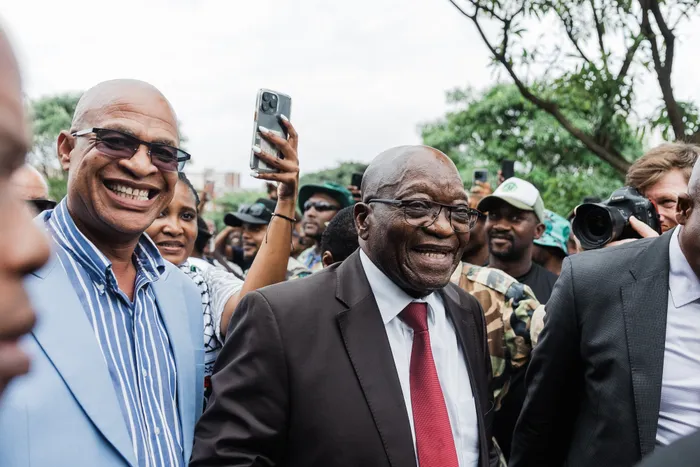Khumalo, MK Party refuse to back down on opposing first sitting positions

Former president Jacob Zuma and suspended MK Party founder Jabulani Khumalo find themselves on the opposing sides of the first sitting of Parliament after separate interdicts.
Suspended MK Party founder Jabulani Khumalo has filed his own interdict with the Western Cape High Court seeking to interdict Parliament from removing him from the party’s candidates list for the National Assembly’s first sitting scheduled for Friday.
Khumalo’s attempts came just when the MK Party filed their papers seeking to interdict the sitting of Parliament on the back of allegations of vote rigging by the Independent Electoral Commission of South Africa (IEC).
Khumalo’s case is expected to be heard before the Western Cape High Court on Thursday, a day before the envisaged first sitting.
Khumalo’s application is against the National Assembly, the MK Party and leader Jacob Zuma.
In his application, Khumalo demands that he be reinstated as a member of Parliament for MKP, and wants to stop Zuma and his party from removing his name from the list of candidates, while also urging the court to deliver its verdict by June 12, a day before the first National Assembly seating.
In their papers filed with the Constitutional Court, the MK Party cites the Chief Justice as the first respondent, Secretary of Parliament as second, the IEC as third, President Cyril Ramaphosa as fourth, political parties with designated representatives as fifth to 21st, and parties without designated representatives in the NA as 22nd representatives.
“Please take notice that the above-mentioned applicant intends to apply to this honourable court before 14 June 2024 or so as soon as may be directed by the honourable deputy Chief Justice for an order, Part A pending the finalisation of Part B as set below.
“Directing that this application be heard as a matter of urgency in terms of rule 12 and condoning any related non-compliance with the timelines set out in the rules... That this matter be heard based on exclusive jurisdiction... where applicable, interdicting the first sitting and the second respondents from convening and/or conducting the first sitting of the National Assembly as envisaged in sections 51, 52 and 86 of the constitutions,” the court papers read.
Furthermore, the MK Party through its lawyers, Zungu Incorporated Attorneys, argues that the National Assembly’s first sitting would not be properly constituted given that 58 of their Members of Parliament (MP) candidates would not be part of the proceedings.
The party also wants the Constitutional Court to order a rerun of the May 29 general elections.
“Properly interpreted, section 46 goes against the idea that the first sitting of the National Assembly can take place without the constitutionally prescribed minimum number of members, properly defined as such,” the party explained in its papers.
However, constitutional law expert Pierre de Vos said the decision by more than 50 Members of Parliament not to be sworn in did not amend the provisions of the Electoral Act that fixes the size of the National Assembly at 400.
“Whether they are sworn in or not, the size of the NA as determined by the legislature remains 400.
Section (S) 53 of the Constitution requires one third of the MPs (134) to be present to make ordinary decisions and one half (200) to be present to pass legislation.
“As long as 134 MPs are sworn in and present when the President is elected the election will be valid,” De Vos said.
Section (S) 46 reflected a compromise between negotiators who wanted to keep the size of the National Assembly at 400, and others who wanted to reduce the size to 350 by delegating the determination of the size of the assembly to the legislature, he explained.
“Section (S) 46(2) does this by requiring an Act of Parliament to provide a formula for determining the number of members of the NA, but Section 46(1) restricts the discretion of the legislature to a size between 350 and 400. Section 114 of the Electoral Act, read with Schedule 3 of the Act, fixes the size at 400.
“If the legislature amends these sections to reduce the size to less than 350 or more than 400, this amendment will be invalid for breaching Section 46(1).
On Monday Parliament said it had taken note of the letter from the MK Party informing the institution of its intention to challenge the validity of the election results as declared by the Independent Electoral Commission (IEC).
However, secretary of Parliament Xolile George said the party had misinterpreted the rules as there needed to be a court interdict setting aside the first sitting before Parliament could cancel the sitting.
“Parliament does not agree with MK Party’s interpretation of Section 46 of the Constitution. Parliament is of the view that it is legally bound to facilitate the first sitting of the National Assembly and the National Council of Provinces at a date and time determined by the Chief Justice, and there are no legal impediments preventing this process.
“According to Section 49(3) of the Constitution, unless and until the results of the election are set aside by a court, Parliament must ensure that the sittings proceed as directed.
“The first sittings of the National Assembly and the National Council of Provinces will take place physically, the Parliamentary Administration is in the process of making arrangements to provide travel and accommodation for all members listed by the IEC, as handed over by the Chief Justice, to attend these sittings and the associated on-boarding activities scheduled in Cape Town,” George said.
The Star
siyabonga.sithole@inl.co.za | sipho.jack@inl.co.za